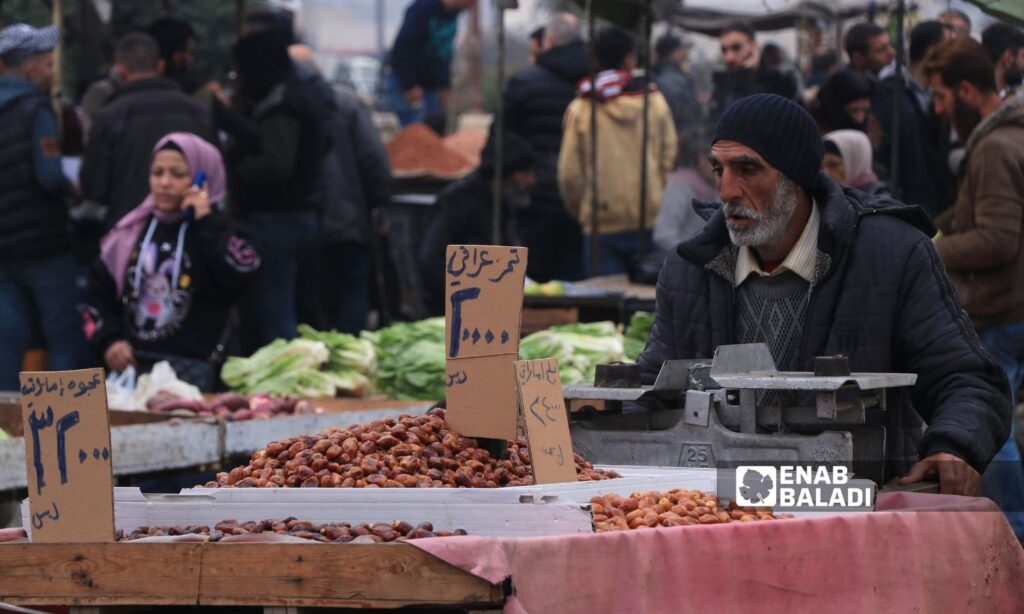The city of Aleppo has faced a water crisis that lasted five consecutive days due to battles between the Syrian Democratic Forces (SDF) and the Syrian National Army (SNA) near the Tishreen dam in the countryside of Manbij, with information about the beginning of repair operations to restore pumping as soon as possible.
Local sources informed Enab Baladi that water began to return on Saturday morning, December 14, to the neighborhoods of Sheikh Taha, Bustan al-Basha, al-Midan, and Sulaimaniya, while it continued to be cut off from the rest of Aleppo’s neighborhoods, amid calls for rationing water consumption until the new pumping schedule is clear.
Aleppo’s Public Foundation For Drinking Water issued a statement saying that the reason for the water outage in the city was due to damage to the electrical networks supplying the treatment plants in al-Khafsah and the Babiri station, which pumps water to the city of Aleppo, resulting from the clashes in the area. The maintenance teams at the electricity company are working hard to repair them as quickly as possible.
The corporation clarified that the water stations do not suffer from any technical issues and are ready to operate as soon as electrical supply is restored, indicating that they will announce the pumping schedule once the lines are repaired.
Many families in different neighborhoods have depleted their water reserves after the available quantities in their tanks ran out, prompting some to resort to filling from tankers that have become a rare commodity that is difficult to access.
Conversely, those lucky enough to reach a water tanker paid at least 300,000 Syrian pounds (approximately 24 USD) for 1,000 liters of water, noting that the tanker owner refuses to fill for a single household and requires an agreement from more than one household in the same building to fill their tanks before agreeing to come.
The damage to the electricity lines supplying the water stations was a result of the battles that took place between opposition factions on one side and the SDF on the other, around the Tishreen dam, located about 30 kilometers southeast of the city of Manbij in the countryside of Aleppo.
Electricity crisis
In terms of electricity, the hours of supply in the city of Aleppo have declined compared to what they were in the early days after the city fell out of the regime’s control. The electricity situation has reverted to how it was previously, with 22 hours of outage versus two hours of supply in most neighborhoods.
Residents depend on ampere subscriptions, which have returned to their previous prices of up to 70,000 pounds per week per ampere for approximately eight hours, on average for most power generators.
A few days ago, there was a sense of optimism in Aleppo regarding the potential end of the ampere burden, as discussions about a complete change in the electricity situation emerged, along with the continued supply of electricity for 24 hours, and videos circulated claiming that electrical transformers had entered the city to support the electricity network, providing current to all neighborhoods without rationing.
Hopes for improved internet services
Landline internet has resumed continuous operation in the city of Aleppo after facing repeated outages last week, while the Syrian Telecommunications Company announced that it continues to collect bills via electronic payment.
However, some neighborhoods are experiencing internet outages, as residents in the Jami’yat al-Zahra neighborhood reported interruptions in internet and landline communications due to cable theft, urging officials to resolve their issue as soon as possible.
The same situation applies to residents in the Bustan al-Qasr neighborhood, where the main cable was also stolen, leading to the disruption of landline internet for the residents, in light of rising fees for mobile internet packages.
Although the state of services in the city of Aleppo has not yet transformed into the ideal condition its citizens aspire to, a sense of optimism about improving situations prevails in the city, which suffered during the rule of the ousted regime from service neglect, bribery, and favoritism in exchange for obtaining the most basic services and essentials for life.
On November 30, the Syrian opposition factions announced control over the city of Aleppo, and life began to gradually return to normal after a period of calm, fear, and anticipation.

